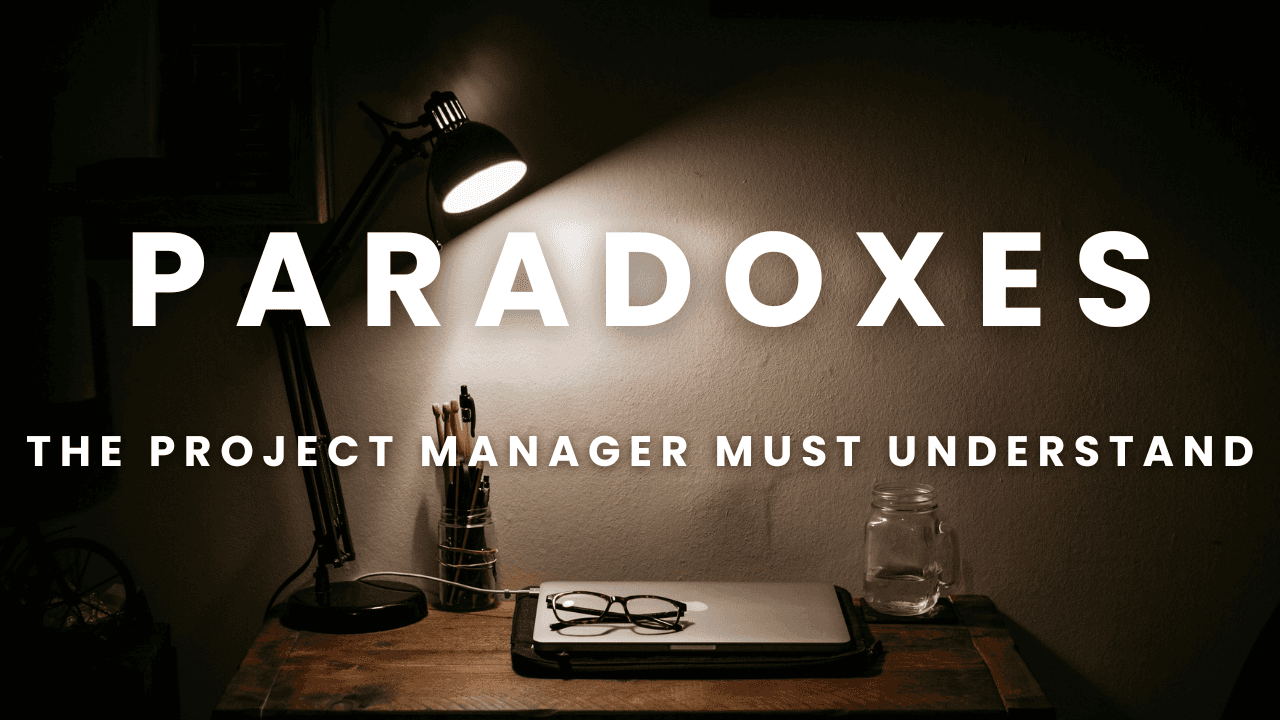Published in Project Management

Ethan Wilson
Civil Engineer / Project Manager
June 16, 2024
The Top 3 Paradoxes in Project Management
Make sure you understand the top 3 paradoxes in project management. Discover how resting can be as crucial as working, why speaking less can make your voice more impactful, and the surprising power of delegation. Learn to navigate these paradoxes and transform not just your projects, but your entire approach to productivity and leadership. Don't miss out on the opportunity to revolutionize your project management style and unlock new levels of efficiency and freedom.
The world is full of paradoxes. Ideas and thoughts we consider to be true, but which are not. We often buy in to these paradoxes without thinking. The problem is that they can be obstacles in our path. In this article we will show you the 3 most important paradoxes that the project manager must understand and overcome. This will not only make you a better project manager, but the benefits will continue into all parts of your life. As an added bonus, understanding these paradoxes will save you hours in your week and help you achieve much much greater levels of freedom.
The Rest Paradox
It always feels as if you need to work harder. And work more consistently without breaking. It is as if we are wired to fill up our day; the 8 hours we are told we need to dedicate to work. The paradox is that working in long, slow efforts is not ideal. At worst it is actually counterproductive.
The creative industry has long known that they need to work like athletes. Sprint and rest. Sprint and rest. They do their creative work in explosive bouts. And find they get more done that way. Then when it is time to rest, they rest fully. No “junk miles”. No half-effort-waste-of-time workouts. The resting is just as important as the sprinting, because without rest there is not enough energy to sprint. We should apply the same to our project management efforts. Sitting at your desk in a dreary state all day may make your bosses feel good. It may even make you feel like you are doing “what you are supposed to do”, but it is hurting your projects.
The solution is really quite simple. Experiment. Find out when you are most productive and for how long you are most productive. You may like to work from 5am to 6am. Then rest, exercise, take the kids to school etc. Then come back at 9am for another session. Perhaps an afternoon walk before finishing your day. Or maybe your day does not end at 5pm. Perhaps it ends at 2pm. And restarts at 8pm. Try out several iterations until you find out what works for you.
Remember that you will need to communicate with your team and your management. You don’t want to be suddenly unavailable when they need you and you don’t want to fill up your rest periods with someone else’s “urgent” tasks or meetings. Then we are right back to where we started. Agree to a trial period and be open and honest. You may find out that you will be able to get more done, in less time, and live a life more free to pursue your other interests. Like an effective project manager.
The Paradox of Being Heard
We all want to be heard and we think our opinions are important. They most likely are. However in order to be heard we can sometimes default to being overbearing. We can try to impose our presence on a discussion or meeting. In this way we make ourselves seen to be impatient, frustrating, not a team player or at worst, obnoxious. The paradox is that if we want to be heard, we actually need to speak less and listen more.
There are two skills at play here. First is the skill of listening more, and listening actively. Listening to understand rather that listening to respond. We are very quick to formulate a response when someone speaks to us. After their first sentence we are ready to reply. We project forward and decide that we know exactly what the full extent of the speaker’s point may be. To listen actively we need to be open to the idea that we are not fortune tellers and we may in fact be wrong. And even if we are right, we may still learn something from listening. Practice delaying the formulation of a response in your mind. Hold on for longer than you are comfortable. Let the speaker talk for a few more seconds or a few more sentences. It is actually a wonderful thing. That those who can listen longer before deciding on an appropriate conclusion are better thinkers than those who cannot. So listen longer. Make it an effortful practice until it becomes part of who you are.
Speaking less means knowing when your input is valuable and when it truly makes an impact. Then simply remain quiet if what you need to say is not a giant leap forward for the discussion. The surprising, but logical paradox here is that when you only speak with high impact, people will become trained to take what you say more seriously. This will happen over time; and both their confidence in you and your confidence in yourself will grow.
Micromanagement and Productivity
Most of us have a somewhat positive view of our experience and skills. We think we are right and that we know the best ways to do things. If we thought we were wrong, we would change. Right? However this is the paradox. We are often not the best person for a task and we actually don’t know the best way to get it done. Stubbornly clinging to control and directing our team with tiny details may actually be the cause of our problems.
Delegation is the art of strategically giving work to others. Work that is in their sphere of genius, and not in ours. When we delegate smartly we are improving the quality of work being done. There are a few parts to this. First we need to understand ourselves. Second we need to understand others. Like all of us, you are brilliant at some things, and not at others. Your brilliance is your zone of genius. Spend time finding your zone of genius and write it down. Ruminate on it. This will allow you to really make sure you understand it correctly. Then ask others in your team to do the same. There are no right and wrong answers in this process. Once everyone has carefully thought about their particular zone of genius, the group should share their findings. You may find that some tasks fall naturally into the expertise of some. They enjoy these tasks and are good at them. Some tasks may be enjoyable, but mastery has not yet been reached. Target training interventions here. When your team receive training and mentorship in things they enjoy, they will be much more likely to find job satisfaction and to do better work. A win-win. The third win is that by freeing yourself from work, you are able to focus on your own A+ tasks, as well as have more freedom in your week. Don’t see delegation as laziness, approach it as strategic growth and a lever on efficiency.
Conclusion
It's important to think about what you take for granted. To not make decisions every day based on things that you haven't thought through. Take guidance from the scientific method: Look at your actions and look at the results. Try different actions and observe different results. Stick with what works. Don't be dogmatic. We can only improve when we are open to being wrong.


